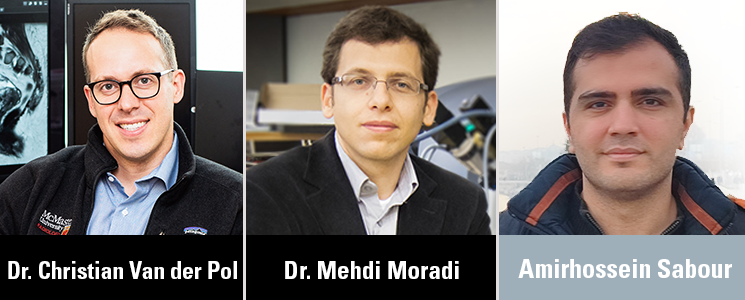Partnerships between the Faculty of Health Sciences and Faculty of Engineering to
advance the application of AI in biomedical research
The Heersink Signature Scholarship initiative is an innovative pilot project designed to foster the swift integration of artificial intelligence (AI) into health sciences research. It aims to address significant biomedical research challenges through partnering Faculty of Health Science (FHS) trainees with biomedical and dataset knowledge alongside Engineering trainees with AI expertise.
A total of $200,000 awarded to trainee pairs
Scholarship recipients will engage in The Clinic’s health innovation programs to develop fundamental competencies in innovation, commercialization, and entrepreneurship. Moreover, supervisors and trainees are encouraged to participate in AI interest groups, fostering open discussions on topics such as dataset security, emerging needs, problems, and other AI-related subjects.
2024 Heersink Signature Scholarship Recipients
Pairing major research labs with AI expertise

Expandable List
Project focus: Metabolic dysfunction, fatty liver disease, and machine learning
Dr. Gregory Steinberg, co-director of the Centre for Metabolism, Obesity, and Diabetes Research, and Dr. Andrew Gadsden, associate professor in the Department of Mechanical Engineering, are supervising a new project leveraging machine learning to characterize metabolic dysfunction in fatty liver disease, aiming to automate diagnosis and advance treatment strategies for Metabolic Dysfunction Associated Fatty Liver Disease (MAFLD).
Trainees:
- Dong Dong Wang
- Yuandi (Eddy) Wu
Project focus: Major bleeding prediction, acute leukemia, and machine learning
Dr. Donald Arnold, co-director of the Michael G. DeGroote Centre for Transfusion Research, Dr. Mehdi Moradi, associate professor in the Department of Computing & Software, and Dr. Andrew Gadsden, associate professor in the Department of Mechanical Engineering, are employing machine learning to predict major bleeding in acute leukemia patients, looking to enhance outcomes and alleviate strain on blood transfusion resources.
Trainees:
- Alessandro Giuliano
- Aurelle Tchagna Kouanou
Project focus: Drug discovery, Glioblastoma, and AI
Dr. Sheila Singh, director of the Centre for Discovery in Cancer Research, and Dr. Jon Stokes, associate professor in the Department of Biochemistry and Biomedical Sciences, are innovating an AI-driven drug discovery for treatment-resistant Glioblastoma.
Trainees:
- Jeremie Alexander
- Vaseem Shaikh
Project focus: Diagnostic imaging and AI
Dr. Christian Van de Pol , associate professor in the Department of Medical Imaging, and Dr. Mehdi Moradi, associate professor in the Department of Computing & Software, are pioneering a foundation radiology model. Trained in extensive collections of labeled and unlabeled multimodal imaging and clinical data, this model supports primary tasks such as disease detection, segmentation, measurement, and reporting across various modalities and specialties.
Trainees:
- Amirhossein Sabour
- Yassir Almalki
The Heersink Signature Scholarship initiative will:
pair AI expertise with health science datasets to drive new discoveries;
drive the early adoption of AI as an emerging technology;
solve important biomedical research problems; and
create innovation synergy between the Faculty of Health Sciences and the Faculty of Engineering.







